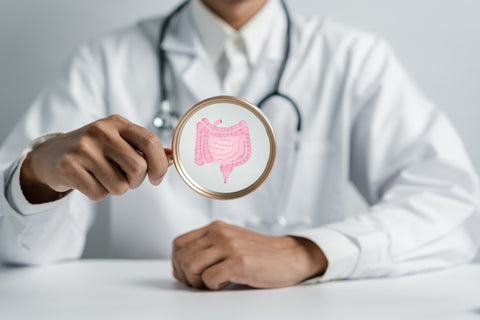
Do you struggle to get a peaceful, restorative, and full night of blissful sleep?
In honor of World Sleep Day and National Napping Day this month, we are exploring new and unique supplement options that could support healthy sleep and your well-being.
Research continues to confirm the gut microbiome plays a significant role in many physiological processes outside the gut, including sleep quality.1 You might be thinking, “How can the bacteria in my gut affect my sleep quality,” which is a very reasonable question. This blog post will explore the fascinating connection between sleep and gut health.

Sleep, the Gut-Brain Axis, and the Vagus Nerve Pathway
The gut-brain axis is a communication pathway between the microbiota of the gastrointestinal tract and your nervous system. This communication pathway allows a two-way exchange of information; thus, your brain can affect your gut, and your gut health can affect your brain.2,3
If you have ever had a “gut feeling,” or if you have ever known you are nervous, anxious, or hesitant because of gut symptoms, then you are one of the lucky people who has felt the effects of the gut-brain axis in real-time. The gut is even known as your “second brain.”4
The gut-brain axis provides a direct pathway of communication between the gut microbiome and sleep-related brain cells.5
The vagus nerve is the nerve that anatomically connects the gut with brain neurons. A wide variety of signals from the gut use the vagus nerve (vagal) pathway to impact sleep and the brain. Research shows organisms in the gut microbiome from the genus Lactobacillus directly improve gastric vagus nerve activity.5
Regarding sleep, animals exposed to chronic vagus nerve stimulation (VNS) experience increased REM sleep, according to research. VNS also induces changes in the levels of several neurotransmitters, including serotonin and GABA, which can then affect the sleep-wake cycle, as discussed below.5

The Gut Microbiome, Sleep, and GABA (Gamma-Aminobutyric Acid)
The gut microbiome affects systemic health via the production of metabolites and compounds with neuroactive, metabolic, and immunomodulatory properties that then circulate to affect organs and systems throughout your body. The gut microbiome even produces neurotransmitters, such as gamma-aminobutyric acid (GABA).1,6
GABA supplementation is well-known for supporting optimal sleep quality, balanced mood, stress management, and reduced anxiety.5 Research shows certain members of the genus Bifidobacterium, which are often present in probiotic supplements, produce GABA.5
GABA is an inhibitory and sleep-promoting neurotransmitter that plays a role in sleep homeostasis, and higher fecal levels of GABA are present when the gut microbiome is healthier and free of specific pathogens, per animal studies.1,5,7,8
In a recent clinical trial, sleep quality was assessed in 40 healthy adults before and after four weeks of supplementation with a prebiotic. The prebiotic supplementation significantly improved the duration of non-REM sleep stage 3 (N3) and increased the total time in bed. Analysis revealed the beneficial changes in sleep quality were likely caused by increased levels of the gut microbiome metabolites GABA and propionate, a short-chain fatty acid, in fecal samples.9

Sleep and Short Chain Fatty Acids (SCFAs)
Short-chain fatty acids (SCFAs), including propionate, are produced by the gut microbiome when dietary fiber, a prebiotic, is fermented. SCFAs are involved in numerous physiological processes, including sleep behavior and quality.5,9
Shimizu et al. determined shorter sleep times correlate with lower levels of SCFAs in stool samples and fewer SCFA producers in the gut microbiome.10 Additional research shows higher fecal concentrations of certain SCFAs in infants are associated with longer uninterrupted sleep.11
Increased SCFA production improves sleep concerns by maintaining and repairing the gut barrier, stimulating the secretion of sleep cytokines, inhibiting inflammatory pathways, and increasing the secretion of serotonin.12 Yes, gut microbiota-derived SCFAs regulate the synthesis of gut-derived serotonin.13
More research is needed to further explore the fascinating effects of SCFAs on sleep health.5

The Gut Microbiome, Serotonin, and Melatonin
Your gut microbiome affects your whole body via the production of metabolites, including neurotransmitters, that can have local and systemic physiologic effects.1,6,14 Multiple studies suggest the serotonin produced in the gut has local effects and plays a role in the maintenance of brain serotonin balance.6
Serotonin is produced in impressively abundant amounts in the gut. In fact, your gut produces more than 90% of all the serotonin in your body. Several bacterial strains produce serotonin, including members of the genus Lactobacillus, which are commonly present in probiotic blends.5
Vagus nerve fibers in the gut express serotonin receptors, so serotonin production modulates one type of communication that occurs along the vagal pathway of the gut-brain axis. Optimal serotonin production is critical for daily mood, memory, sleep, learning, and feeding regulation.5
Serotonin is also the precursor for melatonin. Yes, melatonin is produced from serotonin.15 Melatonin is known as the “sleep hormone” because it plays a critical role in the regulation of the sleep-wake cycle. Nighttime darkness triggers the secretion of melatonin from the pineal gland in the brain to induce sleep. Melatonin is also produced by the gut, skin, bone, and other organs.5
After a meal, your gut can produce up to 400 times more melatonin than the pineal gland secretes in the brain. Further investigation is needed to fully understand the impact gut-derived melatonin has on the sleep-wake cycle.5

The Gut Microbiome, Histamine, and Sleep
Histamine is a biogenic amine secreted by some bacterial strains in your gut microbiome. Purposefully supplementing with bacterial strains that do not produce histamine may support healthy sleep since histamine is known to modulate the sleep-wake cycle by promoting wakefulness.5,16
Anyone who has taken an antihistamine, such as diphenhydramine (Benadryl), knows blocking histamine can cause extreme sleepiness!17
The Gut Microbiome, Sleep, and the Immune System
The gut microbiome produces several other metabolites that may affect your ability to get a good night’s sleep, including molecules that affect your immune system.5
The gut is your body’s largest immunological organ, and the gut microbiome plays a significant role in the immune activities of the gut. One study showed transplantation of gut bacteria from sleep-deprived humans into germ-free mice increased levels of IL-6, an inflammatory molecule associated with insomnia.5
Studies show that those who sleep for a short duration have more of the opportunistic pathogen Pseudomonas spp. in their gut microbiome compared to those who sleep for an optimal amount of time.5
Ask your doctor to order a GI Health Panel today to check for gut pathogens, measure gut inflammation levels, and assess the health of your gut microbiome!*

How to Get More Deep Sleep (How to Fall Asleep Fast!)
Hopefully, the answer is now clear - maintain a healthy gut microbiome to get a good night’s sleep!*
Sleep is an essential, unique, and complex process that is necessary for optimal mental, emotional, and physical health. We now know there are many underlying causes of sleep issues, including a suboptimal gut microbiome.5,18
Research shows the composition of the gut microbiome and decreased microbial diversity are associated with chronic and acute insomnia, with more significant alterations present in chronic insomnia. A lower diversity of the gut microbiome is also associated with less total sleep time in adults. Per researchers, insomnia might be caused by a relative increase in wake-promoting metabolites and a decrease in sleep-promoting metabolites produced in the gut.5,19,20
Insomnia is the most common sleep disorder, and research continues to demonstrate a link between the health of the gut microbiome and insomnia. Thus, many doctors and researchers are beginning to suggest the gut microbiome could be a clinically useful therapeutic target for the treatment of insomnia.5,19
Clinical and animal studies show supplementation with prebiotics, Lactobacillus spp., Bifidobacterium spp., and gut microbiome metabolites, such as SCFAs, support sleep quality and quantity.5
Traditional medications for sleep concerns can have significant side effects, so the exploration of new options that could support healthy sleep is urgently needed. As examined above, probiotics, prebiotics, and postbiotics that maintain a healthy gut microbiome could be beneficial options to support a full night of blissful sleep.*
And don’t forget other supplement options that are known to support healthy sleep, including magnesium and Ashwagandha!*

InterPlexus Supplements that Support Healthy Sleep*
Fortéfy™ is a powerful dairy-free probiotic supplement that restores and protects your gut microbiome to provide superior gastrointestinal support and promote healthy sleep.*
IPX-Booster Super Strength™ is a liquid postbiotic supplement that contains a nourishing blend of postbiotic nutrients produced by the beneficial bacteria of the gut microbiome to help boost your metabolism, provide superior immune support, and foster blissful sleep.*
Seriphos™ provides superior adrenal support to help with stress management and maintain restful deep sleep.*
Magnesium3 is a highly bioavailable magnesium supplement that supports healthy, regenerative, and undisturbed sleep.*
References:
- Haarhuis JE, Kardinaal A, Kortman GAM. Probiotics, prebiotics and postbiotics for better sleep quality: a narrative review. Benef Microbes. 2022;13(3):169-182. doi:10.3920/BM2021.0122
- Irum N, Afzal T, Faraz MH, et al. The role of gut microbiota in depression: an analysis of the gut-brain axis. Front Behav Neurosci. 2023;17:1185522. doi:10.3389/fnbeh.2023.1185522
- Chen Z, Feng Y, Li S, et al. Altered functional connectivity strength in chronic insomnia associated with gut microbiota composition and sleep efficiency. Front Psychiatry. 2022;13:1050403. doi:10.3389/fpsyt.2022.1050403
- Mayer EA. Gut feelings: the emerging biology of gut-brain communication. Nat Rev Neurosci. 2011;12(8):453-466. doi:10.1038/nrn3071
- Wang Z, Wang Z, Lu T, et al. The microbiota-gut-brain axis in sleep disorders. Sleep Med Rev. 2022;65:101691. doi:10.1016/j.smrv.2022.101691
- Chaudhry TS, Senapati SG, Gadam S, et al. The Impact of Microbiota on the Gut-Brain Axis: Examining the Complex Interplay and Implications. J Clin Med. 2023;12(16):5231. doi:10.3390/jcm12165231
- Gottesmann C. GABA mechanisms and sleep. Neuroscience. 2002;111(2):231-239. doi:10.1016/s0306-4522(02)00034-9
- Jiang H. Hypothalamic GABAergic neurocircuitry in the regulation of energy homeostasis and sleep/wake control. Med Rev (2021). 2022;2(5):531-540. doi:10.1515/mr-2022-0022
- Tanihiro R, Yuki M, Sasai M, et al. Effects of Prebiotic Yeast Mannan on Gut Health and Sleep Quality in Healthy Adults: A Randomized, Double-Blind, Placebo-Controlled Study. Nutrients. 2023;16(1):141. doi:10.3390/nu16010141
- Shimizu Y, Yamamura R, Yokoi Y, et al. Shorter sleep time relates to lower human defensin 5 secretion and compositional disturbance of the intestinal microbiota accompanied by decreased short-chain fatty acid production. Gut Microbes. 2023;15(1):2190306. doi:10.1080/19490976.2023.2190306
- Heath AM, Haszard JJ, Galland BC, et al. Association between the faecal short-chain fatty acid propionate and infant sleep. Eur J Clin Nutr. 2020;74(9):1362-1365. doi:10.1038/s41430-019-0556-0
- Tang M, Song X, Zhong W, et al. Dietary fiber ameliorates sleep disturbance connected to the gut-brain axis. Food Funct. 2022;13(23):12011-12020. doi:10.1039/d2fo01178f
- Appleton J. The Gut-Brain Axis: Influence of Microbiota on Mood and Mental Health. Integr Med (Encinitas). 2018;17(4):28-32.
- Zhou J, Wu X, Li Z, et al. Alterations in Gut Microbiota Are Correlated With Serum Metabolites in Patients With Insomnia Disorder. Front Cell Infect Microbiol. 2022;12:722662. doi:10.3389/fcimb.2022.722662
- Claustrat B, Leston J. Melatonin: Physiological effects in humans. Neurochirurgie. 2015;61(2-3):77-84. doi:10.1016/j.neuchi.2015.03.002
- Alhusaini M, Eissa N, Saad AK, et al. Revisiting Preclinical Observations of Several Histamine H3 Receptor Antagonists/Inverse Agonists in Cognitive Impairment, Anxiety, Depression, and Sleep-Wake Cycle Disorder. Front Pharmacol. 2022;13:861094. doi:10.3389/fphar.2022.861094
- Holst SC, Landolt HP. Sleep-Wake Neurochemistry. Sleep Med Clin. 2022;17(2):151-160. doi:10.1016/j.jsmc.2022.03.002
- Pang X, Chen L, Xu G. New Awareness of the Interplay Between the Gut Microbiota and Circadian Rhythms. Pol J Microbiol. 2023;72(4):355-363. doi:10.33073/pjm-2023-046
- Smith RP, Easson C, Lyle SM, et al. Gut microbiome diversity is associated with sleep physiology in humans. PLoS One. 2019;14(10):e0222394. doi:10.1371/journal.pone.0222394
- Tanaka A, Sanada K, Miyaho K, et al. The relationship between sleep, gut microbiota, and metabolome in patients with depression and anxiety: A secondary analysis of the observational study. PLoS One. 2023;18(12):e0296047. doi:10.1371/journal.pone.0296047







Leave a comment